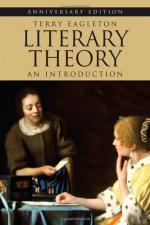
|
| Name: _________________________ | Period: ___________________ |
This quiz consists of 5 multiple choice and 5 short answer questions through Chapter 1, Rise of the English.
Multiple Choice Questions
1. According to Eagleton, what does his book try to demonstrate about a body of literary theory?
(a) That there is one body of literary theory that springs from and is applicable to literature alone.
(b) That there is sometimes a body of literary theory that springs from and is applicable to literature alone.
(c) That there are several bodies of literary theory that spring from and is applicable to literature alone.
(d) That there is no body of literary theory that springs from or is applicable to literature alone.
2. According to Eagleton, the approaches outlined in his book have implications where?
(a) Well beyond literature.
(b) Well beyond politics.
(c) Well beyond language.
(d) Well beyond feeling.
3. How did the Romantic artist reflect her or his work in its detachment from history itself?
(a) Because she or he was seen as a producer of commodities who sold their goods for high pay.
(b) Because she or he was seen as a consumer of commodities who bought their goods for low pay.
(c) Because she or he was seen as a minor commodity who existed on the margins of society.
(d) Because she or he was seen as a major commodity who existed within society.
4. According to Eagleton, "if one were asked to provide a single explanation for the growth of English in the later nineteenth century" what would it be?
(a) The success of government.
(b) The failure of religion.
(c) The failure of government."
(d) The success of religion."
5. According to Eagleton, William Empson "insists on treating poetry as a species of ______language."
(a) Secular.
(b) Spectacular.
(c) Religious.
(d) Ordinary.
Short Answer Questions
1. What person is NOT included in the ranks of Russian formalists?
2. During the 1960s, what kind of students began to enter higher education that broke down assumptions about literary studies?
3. According to Eagleton, the formalists were not out to define literature but they were out to define what?
4. Eagleton argues that a literary work in Romantic society becomes what rather than rational and mechanical?
5. What kind of language does Eagleton say people think of literature as?
|
This section contains 368 words (approx. 2 pages at 300 words per page) |

|




